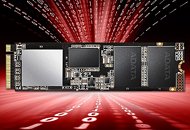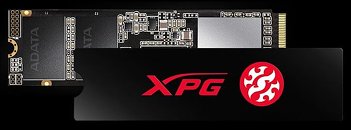Tuesday, August 13th 2019

ADATA Launches 2 TB Version of Its XPG SX8200 Pro NVMe SSD
Amidst falling prices of NAND flash and increased desirability from users' part, companies have been expanding their portfolio of SSD offerings for the consumer side of the fence as well as the enterprise one. ADATA's XPG SX8200 Pro SSD was initially only offered in 256 GB, 512 GB, and 1 TB configurations, but in the case of SSD storage, "moar" is usually better. We'll see when do 256 GB offerings get discontinued, but I'd give it another pair of years at the most.
The ADATA XPG SX8200 Pro features Silicon Motion's SM2262EN controller packing eight NAND channels, four ARM Cortex-R5 cores, support for NVMe 1.3, LDPC ECC, RAID engine et all (eh), paired with Micron's 3D TLC NAND - no QLC here, folks. The SSD offers up to 3.5 GB/s sequential read speed and up to 3 GB/s sequential write speed, and up to 360K random read/write 4K IOPS. The ADATA SSD features a TBW rating of 1280 TB over a 5-year warranty period - and a MTBF (Mean Time Between Failures) rate of 2,000,000 hours (something like 83.333, 33 (3) days of continuous usage. Now that's north of two hundred years of continuous operation, which makes me sad just thinking about it and what I'd do with that time. In another conscience state, perhaps. ADATA's 2 TB XPG SX8200 Pro is $289.99, in select European countries (from eBay) at about €308, and in Japan for ¥36,680.
Source:
AnandTech
The ADATA XPG SX8200 Pro features Silicon Motion's SM2262EN controller packing eight NAND channels, four ARM Cortex-R5 cores, support for NVMe 1.3, LDPC ECC, RAID engine et all (eh), paired with Micron's 3D TLC NAND - no QLC here, folks. The SSD offers up to 3.5 GB/s sequential read speed and up to 3 GB/s sequential write speed, and up to 360K random read/write 4K IOPS. The ADATA SSD features a TBW rating of 1280 TB over a 5-year warranty period - and a MTBF (Mean Time Between Failures) rate of 2,000,000 hours (something like 83.333, 33 (3) days of continuous usage. Now that's north of two hundred years of continuous operation, which makes me sad just thinking about it and what I'd do with that time. In another conscience state, perhaps. ADATA's 2 TB XPG SX8200 Pro is $289.99, in select European countries (from eBay) at about €308, and in Japan for ¥36,680.


19 Comments on ADATA Launches 2 TB Version of Its XPG SX8200 Pro NVMe SSD
works great, would love the extra storage, when these drop at a good price on the Jungle they are great value
I think people have to get rid of those demons called "only SLC/MLC is worthy of buying".
You seem you have no idea how TBW works these days.
What you see on the package is a Marketing value of TBW. This TBW is only reached in ideal workloads.
So, MX500 500GB SSD has 180TBW, it states 98GB writes per day for 5 years.
The reality is not that good as it sounds.
Currently 18TB written into my drive now, and it is degraded by 21% (79% life remaining)
Thats about 37,5GB per day for 16 months now ( i don't even know what is actually writing this much data into my SSD, but i always have chrome open with like 20 tabs )
Judging by marketing material, it would seem that it should be showing only 10% wear level right?
I also have SX8200 (non pro) and the trend is the same. Wears out much faster than it should.
And yes - chrome (and any other browser) can be the culprit for such huge workout - constantly writing down the cache while You use it... One way to prevent it would be to move the cache to a normal HDD.
Had one r0 matrix fail on me 10 years ago, ruined my music collection - all files full of jitter... Spent months bringing it back from the CDs.
From that moment I'm a zealous worshipper of one saying: "there are two types of people - those that do backup, and those that will start doing backup". Also ditched all raid0 ideas - since SSDs are way faster than HDD, there's no point for me to risk it for small performance improvements.
You would assume that TBW is the minimum ammout of data you will write until it reaches 0% no matter what is the workload, but its not.
If Crucial was stating that lowered health on a SDD is normal, for me it sounds like washing their hands...
860 Evo dead, twice, replaced
SM951 over heated damaged it's nand, replaced
PM981 over heats, replaced
This is personal or near to me machines. I had those drives replaced under warranty. I have several Samsung drives that have been perfect so far though. Samsung has funky drives and NAND failures too.
I've branched out besides being an Intel/Samsung SSD loyalist. MX500, MP510, SX8200NP and 8200PNP.
I use the ram buffering offered by Samsung and Crucial to hopefully lessen the cache thrashing wear on the drive. I also tend to run an over-partition of 10% on all of the drives for better wear leveling.